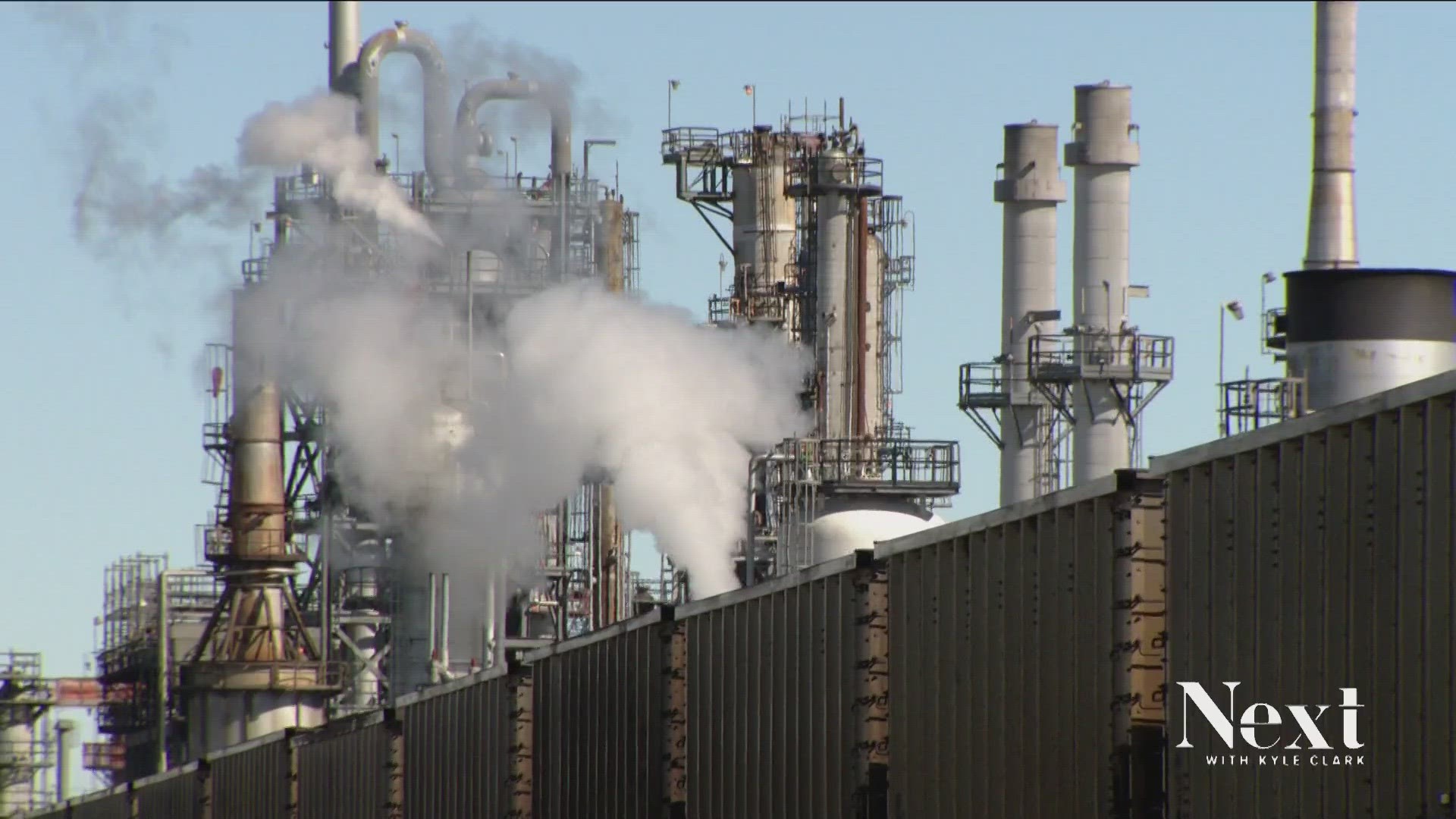DENVER — A community group that's monitored the air around the Suncor refinery for a year says they have evidence the people who live near the refinery are breathing air that can make them sick.
Their next challenge is getting anyone to pay attention to their concerns.
The Latinx community group Cultivando set off to do its own research, saying they don’t trust the state or Suncor to accurately monitor pollution coming from the refinery. Among the key findings, the group says Suncor is a source of airborne radioactivity, multiple types of pollutants, and high variability in pollutant concentrations based on season and time of day.
"I personally don’t feel that it is safe to be breathing in this air and I think the data demonstrates that it is dangerous to human health," executive director of Cultivando, Olga Gonzalez, said.
Her organization’s new research shows what she says she’s known for a long time.
"When we’ve shared these results with the communities who live there, it wasn’t so much that they didn’t know that they were being poisoned, but the extent in which they were being poisoned was really shocking for everyone," Gonzalez said. "I’ve had mother’s come to us over the years with concerns about their children having nosebleeds and headaches and breathing problems. They blame themselves. Now that we know that it’s happening in our community and the monitoring is proving these toxics do have a correlation, they no longer blame themselves. They know the fault does not lie with them, but rather with Suncor."
Suncor told 9NEWS it launched its own community air monitoring program in 2021. The refinery said its tests show pollutant levels have remained below the guidelines set by the state and federal agencies.
"Suncor is supportive of all air monitoring efforts, which is why we voluntarily launched a community air monitoring program – Commerce City North Denver (CCND) Air Monitoring – more than a year ago. As part of the program, independent health scientists conduct health risk assessments based on the data collected. Since the CCND Air Monitoring program launched in August 2021, compounds measured in multiple North Denver communities have remained below acute and chronic health protective guideline values routinely used by state and federal public health agencies," Suncor said in a statement.
Andrew Klooster is a researcher with Earthworks, working with Cultivando to monitor Suncor pollution. He shot video of Suncor with a special camera that can see things like volatile organic compounds.
Wednesday, they released their findings after monitoring the air around Suncor for a year.
"The majority of pollutants you should be concerned about from a health standpoint is not pollution you’re going to be able to see with your naked eyes," Klooster said. "There is a lot of air pollution that is occurring from this facility that is potentially having an impact on the community that lives around this facility."
Cristina Ruiz lives a couple of miles from Suncor and works with Cultivando. For years, the group says they’ve received complaints from people nearby of kids with nosebleeds and headaches. She's worried about her own kids.
"This work, more than anything, I’m doing for them. I want my kids to be healthy," Ruiz said. "I’m more confident now that something will be done."
Suncor shut down in December because an equipment malfunction and is just now becoming fully operational again. The researchers at Cultivando were monitoring the air during that time and say they did not see a significant drop in the number of pollutants in the area. They say that could be because of the weather and cold air trapping pollutants closer to the ground.
The Colorado Department of Public Health and Environment released a statement to 9NEWS on the topic. You can read it in full below.
The Colorado Department of Public Health and Environment partnered with Cultivando to provide them with funding to do their own independent air monitoring through a Supplemental Environmental Project. We wanted their participation in monitoring the site and informing the community. We have reviewed Cultivando’s air monitoring data, and acknowledge it as part of a larger school of information that informs what is going on in the community surrounding Suncor.
We use state and federal standards to assess whether there is a public health risk. Cultivando is looking at short-term spikes in benzene and particulate matter that could come from Suncor and other neighboring sources of pollution. While these spikes are important to monitor and consider, they are snapshots.
To assess potential health impacts from any substance, we consider how much, how long, and how often people are exposed. When evaluating risk, federal guidelines are based on exposure over certain time periods, and you cannot reliably compare a snapshot to the established health-based standards. The community around Suncor has legitimate concerns about pollution, and we share the goal of reducing emissions in the area. We plan to continue our conversations with Cultivando so we can work together to find solutions.
We are closely monitoring emissions in this community, and will continue to evaluate all available health guidelines to guide our work. We are working with Cultivando to understand their process for data analysis and communication. We recently proposed a new rule to enhance monitoring and modeling requirements for, and reduce emissions from, facilities in communities that are impacted by sources of environmental pollution, including the Commerce City community surrounding Suncor.
SUGGESTED VIDEOS: Next with Kyle Clark

